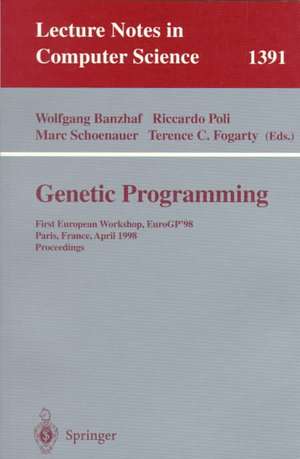Genetic Programming: First European Workshop, EuroGP'98, Paris, France, April 14-15, 1998, Proceedings: Lecture Notes in Computer Science, cartea 1391
Editat de Wolfgang Banzhaf, Riccardo Poli, Marc Schoenauer, Terence C. Fogartyen Limba Engleză Paperback – 25 mar 1998
The volume presents 12 revised full papers and 10 short presentations carefully selected for inclusion in the book. The papers are organized in topical sections on experimental and theoretical studies; algorithms, representations and operators; and applications.
Din seria Lecture Notes in Computer Science
- 20%
 Preț: 1061.55 lei
Preț: 1061.55 lei - 20%
 Preț: 307.71 lei
Preț: 307.71 lei - 20%
 Preț: 438.69 lei
Preț: 438.69 lei - 20%
 Preț: 645.28 lei
Preț: 645.28 lei -
 Preț: 410.88 lei
Preț: 410.88 lei - 15%
 Preț: 580.46 lei
Preț: 580.46 lei - 17%
 Preț: 427.22 lei
Preț: 427.22 lei - 20%
 Preț: 596.46 lei
Preț: 596.46 lei -
 Preț: 449.57 lei
Preț: 449.57 lei - 20%
 Preț: 353.50 lei
Preț: 353.50 lei - 20%
 Preț: 1414.79 lei
Preț: 1414.79 lei - 20%
 Preț: 309.90 lei
Preț: 309.90 lei - 20%
 Preț: 583.40 lei
Preț: 583.40 lei - 20%
 Preț: 1075.26 lei
Preț: 1075.26 lei - 20%
 Preț: 310.26 lei
Preț: 310.26 lei - 20%
 Preț: 655.02 lei
Preț: 655.02 lei - 20%
 Preț: 580.93 lei
Preț: 580.93 lei - 20%
 Preț: 340.32 lei
Preț: 340.32 lei - 18%
 Preț: 938.83 lei
Preț: 938.83 lei - 20%
 Preț: 591.51 lei
Preț: 591.51 lei - 15%
 Preț: 438.59 lei
Preț: 438.59 lei - 20%
 Preț: 337.00 lei
Preț: 337.00 lei -
 Preț: 389.48 lei
Preț: 389.48 lei - 20%
 Preț: 607.39 lei
Preț: 607.39 lei - 20%
 Preț: 1024.44 lei
Preț: 1024.44 lei - 20%
 Preț: 579.30 lei
Preț: 579.30 lei - 20%
 Preț: 763.23 lei
Preț: 763.23 lei - 20%
 Preț: 453.32 lei
Preț: 453.32 lei - 20%
 Preț: 575.48 lei
Preț: 575.48 lei - 20%
 Preț: 585.88 lei
Preț: 585.88 lei - 20%
 Preț: 825.93 lei
Preț: 825.93 lei - 20%
 Preț: 763.23 lei
Preț: 763.23 lei - 17%
 Preț: 360.19 lei
Preț: 360.19 lei - 20%
 Preț: 1183.14 lei
Preț: 1183.14 lei - 20%
 Preț: 340.32 lei
Preț: 340.32 lei - 20%
 Preț: 504.57 lei
Preț: 504.57 lei - 20%
 Preț: 369.12 lei
Preț: 369.12 lei - 20%
 Preț: 583.40 lei
Preț: 583.40 lei - 20%
 Preț: 343.62 lei
Preț: 343.62 lei - 20%
 Preț: 350.21 lei
Preț: 350.21 lei - 20%
 Preț: 764.89 lei
Preț: 764.89 lei - 20%
 Preț: 583.40 lei
Preț: 583.40 lei - 20%
 Preț: 649.49 lei
Preț: 649.49 lei - 20%
 Preț: 341.95 lei
Preț: 341.95 lei - 20%
 Preț: 238.01 lei
Preț: 238.01 lei - 20%
 Preț: 538.29 lei
Preț: 538.29 lei
Preț: 330.10 lei
Preț vechi: 412.62 lei
-20% Nou
Puncte Express: 495
Preț estimativ în valută:
63.16€ • 65.95$ • 52.28£
63.16€ • 65.95$ • 52.28£
Carte tipărită la comandă
Livrare economică 04-18 aprilie
Preluare comenzi: 021 569.72.76
Specificații
ISBN-13: 9783540643609
ISBN-10: 3540643605
Pagini: 248
Ilustrații: X, 238 p.
Dimensiuni: 155 x 235 x 13 mm
Greutate: 0.35 kg
Ediția:1998
Editura: Springer Berlin, Heidelberg
Colecția Springer
Seria Lecture Notes in Computer Science
Locul publicării:Berlin, Heidelberg, Germany
ISBN-10: 3540643605
Pagini: 248
Ilustrații: X, 238 p.
Dimensiuni: 155 x 235 x 13 mm
Greutate: 0.35 kg
Ediția:1998
Editura: Springer Berlin, Heidelberg
Colecția Springer
Seria Lecture Notes in Computer Science
Locul publicării:Berlin, Heidelberg, Germany
Public țintă
ResearchCuprins
A review of theoretical and experimental results on schemata in genetic programming.- Where does the good stuff go, and why? how contextual semantics influences program structure in simple genetic programming.- Fitness causes bloat: Mutation.- Concepts of inductive genetic programming.- Immediate transfer of global improvements to all individuals in a population compared to automatically defined functions for the EVEN-5,6-PARITY problems.- Non-destructive depth-dependent crossover for genetic programming.- Grammatical evolution: Evolving programs for an arbitrary language.- Genetic programming bloat with dynamic fitness.- Speech sound discrimination with genetic programming.- Efficient evolution of asymmetric recurrent neural networks using a PDGP-inspired two-dimensional representation.- A cellular-programming approach to pattern classification.- Evolving coupled map lattices for computation.- Genetic programming for automatic design of self-adaptive robots.- Genetic modelling of customer retention.- An evolutionary hybrid metaheuristic for solving the vehicle routing problem with heterogeneous fleet.- Building a genetic programming framework: The added-value of design patterns.- Evolutionary computation and the tinkerer’s evolving toolbox.- A dynamic lattice to envolve hierarchically shared subroutines.



















